

Teaching Critical Thinking - Sauk Valley Community College. Why is it Important?
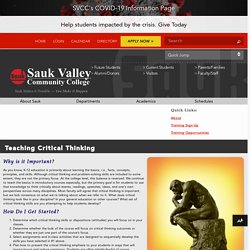
As you know, K-12 education is primarily about learning the basics, i.e., facts, concepts, principles, and skills. Although critical thinking and problem-solving skills are included to some extent, they are not the primary focus. At the college level, this balance is reversed. We continue to teach the basics in introductory courses especially, but the primary goal is for students to use that knowledge to think critically about events, readings, speeches, ideas, and one's own perspectives across many disciplines.
Most faculty will agree that critical thinking is important, but we lack consensus on what we're talking about when we refer to it. How Do I Get Started? Determine which critical thinking skills or dispositions (attitudes) you will focus on in your classes. What Are Some Examples? 2. 5. What Are Additional Resources? In Sauk Library: Student Engagement Techniques (E Barkley): Chap 13 (Analysis and Critical Thinking) Web sites: How to Learn Critical Thinking. Some readers may think you have to be smart to think critically.
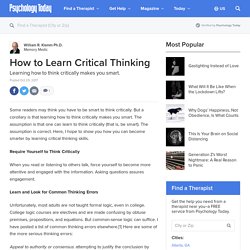
But a corollary is that learning how to think critically makes you smart. The assumption is that one can learn to think critically (that is, be smart). The assumption is correct. Here, I hope to show you how you can become smarter by learning critical thinking skills. Require Yourself to Think Critically When you read or listening to others talk, force yourself to become more attentive and engaged with the information. Learn and Look for Common Thinking Errors Unfortunately, most adults are not taught formal logic, even in college.
Article continues after advertisement Appeal to authority or consensus: attempting to justify the conclusion by quoting an authority in its support or on the basis of how many people hold the same view. 6 Critical Thinking Skills You Need to Master Now. No matter what walk of life you come from, what industry you’re interested in pursuing or how much experience you’ve already garnered, we’ve all seen firsthand the importance of critical thinking skills.
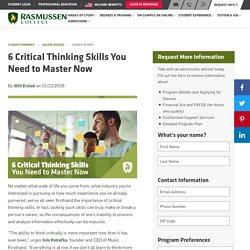
In fact, lacking such skills can truly make or break a person’s career, as the consequences of one’s inability to process and analyze information effectively can be massive. “The ability to think critically is more important now than it has ever been,” urges Kris Potrafka, founder and CEO of Music Firsthand. “Everything is at risk if we don’t all learn to think more critically.” If people cannot think critically, he explains, they not only lessen their prospects of climbing the ladder in their respective industries, but they also become easily susceptible to things like fraud and manipulation. With that in mind, you’re likely wondering what you can do to make sure you’re not one of those people. Critical Thinking and Problem-solving. What is Critical Thinking?
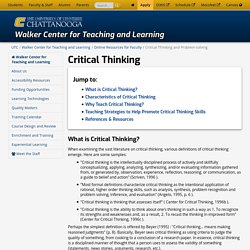
When examining the vast literature on critical thinking, various definitions of critical thinking emerge. Here are some samples: Unlocking the Mystery of Critical Thinking. Critical thinking.

We all endorse it. We all want our students to do it. And we claim to teach it. But do we? Do we even understand and agree what it means to think critically? According to Paul and Elder’s (2013a) survey findings, most faculty don’t know what critical thinking is or how to teach it. This common blind spot is understandable. Stephen Brookfield (2012), a critical theory and adult education specialist, focuses on assumptions.Diane Halpern (2003), who’s been awarded for her teaching and research, takes the perspective of a cognitive psychologist.Richard Paul and Linda Elder (2013b), founding leaders of the Foundation for Critical Thinking, hail from philosophy and education psychology, respectively.Peter Facione (2013), a leadership consultant and former university executive, worked intensively with philosophers in the Delphi Group.Susan Wolcott (2006), an accounting professor, created a developmental model of complex thinking.
Can you find common ground? References: What is Critical Thinking? CERE12-13: Combined student wikis. Deep and Surface Learning: The Literature Tell me, I forget.
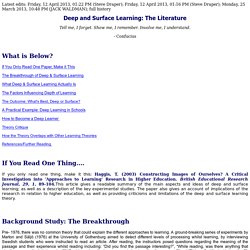
Show me, I remember. Involve me, I understand. - Confucius What is Below? If You Only Read One Paper, Make it This If you only read one thing, make it this: Haggis, T. (2003) Constructing Images of Ourselves? Background Study: The Breakthrough Pre- 1976, there was no common theory that could explain the different approaches to learning. The researchers categorised the answers, and interpreted from them two distinct types of processing which the learners engaged in: deep and surface. What Exactly is Deep and Surface Learning? From the initial study it was concluded that surface learners tended to concentrate on the writer’s main point, and reproducing the main facts. On the other hand, deep learners transformed the knowledge they gained by exploring it beyond the main point.
Table 1: Examples and Features of both Surface-based and Deep learning approaches. Conceptions of Learning What Influences Depth of Learning? Learner Intentions. Teaching Critical Thinking - Faculty Development - Research Guides at Johnson County Community College.